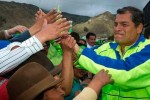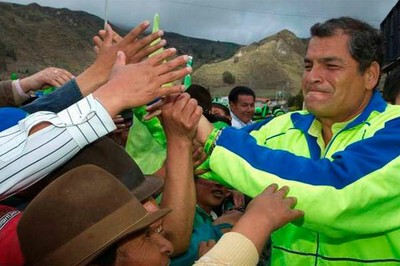 President Rafael Correa celebrates seven years in office in Ecuador, where he has received growing popular support for the Citizen’s Revolution he has implemented.
President Rafael Correa celebrates seven years in office in Ecuador, where he has received growing popular support for the Citizen’s Revolution he has implemented.
The government of the Citizen’s Revolution has changed the face of this country, Defense Minister Maria Fernanda Espinosa told Prensa Latina.
The minister said that in the field of defense, that transformation translates into a change of paradigm, as the armed forces have transformed from guarantors of democracy to guarantors of the people’s welfare.
In the economy, statistics are quite eloquent when showing the improvements enjoyed by Ecuadorians since 2007.
Poverty, for example, dropped by 14 percent, from 37.6 percent in 2007 to 23.6 percent in 2013, according to statistics from the National Planning and Development Secretariat.
The government is also working hard to guarantee 95-percent coverage of basic services such as drinking water and sewage systems, and is aware that those changes will improve nutritional aspects and will eradicate malnutrition, which is also a commitment to the social sector.
The renegotiation of Ecuador’s foreign debt and oil contracts, and the approval of a Hydrocarbons Act that establishes the investment of 12 percent of royalties from oil sales in the communities near the fields have been warmly welcomed by the people.
However, the government wants to change the country’s productive and energy matrix and is betting on the construction of eight hydroelectric plants and on economic diversification.
Correa took office in 2007, after winning the 2006 election with 56.6 percent of votes. After the new Constitution was approved in 2008, he repeated his victory in the 2009 election with 52 percent of votes.
After four years in office, he ran for reelection in February 2013, winning 57.1 percent of votes, an unprecedented victory in Ecuador’s history.
 Escambray ENGLISH EDITION
Escambray ENGLISH EDITION





Escambray reserves the right to publish comments.